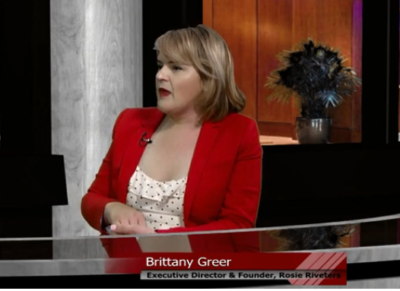Rosie Riveters with Brittany Greer
(June 12, 2019) Catherine Read speaks with Brittany Greer, founder of Rosie Riveters, a STEM (Science Technology Engineering and Math) education program for girls age 4-14. The no-cost extracurricular program is designed to inspire girls to imagine, create and play while developing their skills in science, technology, engineering and mathematics.
Greer’s goal is to equip and empower girls to be strong, confident and competent in the fields of STEM through hands-on projects and mentorship programs. Ultimately, she wants to teach girls to delete the words “I can’t” from their vocabulary, and inspire them to always be confident enough to try. The genesis of the name “Rosie Riveters” stems from the World War II posters that encouraged women to enter into the workforce because the men were off fighting the war. These women did not have practical job skills, but had a can-do attitude. Greer found inspiration in this story, and chose to adopt this name for her program.
Greer founded Rosie Riveters in 2015, after working for many years in the energy industry and noticing that the number of women in STEM fields was not growing. She stepped back from her professional duties in order to establish a program that attracts and inspires young girls to learn in a safe space. Too many times, girls are discouraged from pursuing these fields and do not gain the skill sets and confidence that they need to succeed.
 Her first challenge was to figure out where she would hold the programs. As libraries are in a stage of trying to reinvent themselves as maker-spaces, Greer forged a partnership with the Arlington County Library and secured space at no cost. She got the word out to students in Arlington County Public Schools through the backpack flyer system that allows non-profits to advertise services. By February of 2016, their pilot program was up and running. To date, the nonprofit has served 587 girls, with another 287 sitting on waiting lists.
Her first challenge was to figure out where she would hold the programs. As libraries are in a stage of trying to reinvent themselves as maker-spaces, Greer forged a partnership with the Arlington County Library and secured space at no cost. She got the word out to students in Arlington County Public Schools through the backpack flyer system that allows non-profits to advertise services. By February of 2016, their pilot program was up and running. To date, the nonprofit has served 587 girls, with another 287 sitting on waiting lists.
Their goal is to build interest in STEM topics early on in a girl’s life, and to keep that student engaged and coming back year after year. Children develop friends and cohorts, and have an opportunity to interact with other female students who share their interests. The programs operate in three different models, a 12-session program (one per month), an after school program that spans 6-8 weeks, or a community center program that includes a 5 week summer intensive and once a month during the school year.
Greer recognizes that not every community is the same, and it is important to be able to meet students and families where they are in order to attract and retain them.
So what is it that they do and why do students want to keep coming back? The program is predicated on the concept of trying and failing. At first, this can be very difficult for students to understand, but in the end it builds strength and resiliency.
Each class includes a“project build”. The students first observe a fully operational piece of equipment on a table, along with a pile of materials that would be needed to construct the item. Without any instruction, the students are asked to observe what they see and start working to put pieces together. The teachers act as coaches, giving students ideas and tips about how they can use what they observe to make decisions about how to proceed. This encourages both critical and creative thinking skills, and gives the students space to fail, as everyone is in the same boat together. Afterwards, there would be explanation about what they built and how it works.
Each program lasts two hours, as there needs to be sufficient time for kids to work through their projects. The goal is to encourage girls to explore, experiment and have the confidence to try something new and complex. Everyone affiliated with the program, from teachers to material preparation to mentors, are volunteers. If you have an interest in helping with any aspect of the program, please visit the website to sign up.